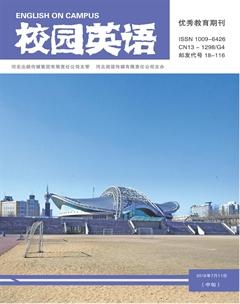What Has Shaped Who I am?
代俊
Among a thousand people such as my parents, my friends, teachers, classmates, co-workers, neighbors, acquaintances, and passers-by, I believe my parents and one of my close friends have had the biggest influence on me. However, it is hard to explain in which particular moment and which specific character of theirs has had changed and influenced me because we do not grow up overnight but day by day. In some sense, these 1000 people around us belong to our discourse and are also shaped by a certain historic and social period. Instead of talking about their influence on me, I would like to look into the cultural backgrounds, because it is the culture that has shaped who I am.
“Culture hides much more than it reveals, and strangely enough, what it hides, it hides most effectively from its own participants. Years of study have convinced me that the ultimate purpose of the study of culture is not so much the understanding of foreign cultures as much as the light that study sheds on our own” (Hall, 1998). Actually, each and every one of us unavoidably lives and grows up in a certain cultural discourse but always, we take it for granted and think it as natural as air, but without that air, nobody is able to survive.
By traveling through the time tunnel, I am on my journey to explore my cultural background and trace back to the ancient times.
Stop 1: Confucianism
I travel back to the past and see what happened then. Because today, my parents, my friends and I are still supposed to stick to some basic rules that our ancestors were obeying thousands years ago, I have to figure out the reason behind it.
Two thousand years ago, here lived Confucius, a great philosopher, ideologist and initiator of Confucianism. He spread his idea around 14 counties. Over several years, his philosophy had been widely accepted by most emperors and their subjects. Later, thanks to his disciples, Confucianism was passed down from one generation to another. “At the heart of the Confucian system lies a linear hierarchy governing family structure, political structure, and the supernatural world. This hierarchy was, as have noted, characterized by various dominance- obedience relationships:men dominating women, old dominating young, and the emperor dominating everyone else. This hierarchy was delineated by clearly defined roles, responsibilities, rituals and customs governing interactions among the occupants of designated positions at various levels ” (Kulich, 2006) Confucianism, despite the drastic changes taking place in China over the past thousands years, still constitutes the foundation of Chinese cultures, our values and beliefs. It is an undisputable fact that Chinese, of course including me, live in a high PDI (Power Distance Index), high MAS (Masculinity Index), low IDV (Individualism Index) culture, on which we can never deny the penetrating influence of Confucianism.
The three cardinal guides (the absolute obedience of subjects to the emperor, sons to their father, and the wife to her husband) and the five constant virtues (benevolence, righteousness, propriety, wisdom and fidelity), though not as deep-rooted as years ago, still make up our core values.
In my point of view, culture is air while Confucianism is nitrogen, which makes up about 3/4 of the air. However, I can never smell, breathe, touch or even see it with our naked eyes. It is actually the substance which is always around us and covers the largest space.
References:
[1]Hall,E.T.(1998).Basic Concepts of Intercultural Communication.NY:Anchor Books.
[2]Kulich,S.J.(2006).Chinese Values in Comparison:The Way We Have Been.Shanghai:Shanghai International Studies University.

